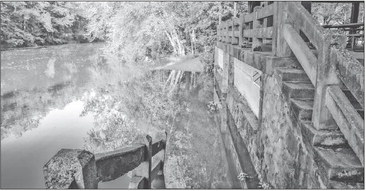Beach testing recommended at Marathon Co. parks


By Kevin O’Brien
Beaches at several Marathon County parks, including the ones at Cherokee and Big Eau Pleine, may be tested for e.Coli contamination starting next year as part of a plan proposed by the county Health Department Kate Florek, the county’s environmental health and safety director, spoke to the Health and Human Services Committee on July 30 about a plan to test beach water at the county’s lab, with the goal of informing the public about any contamination at local swimming locations.
“We know that if you swim in bacteriologically polluted waters, you can have a whole host of health problems that are either through ingestion of the water, inhalation or body contact,” she said, listing everything from sore throats and ear infections to hepatitis and meningitis.
Florek said no testing is currently being done at the county’s beaches, and the Wisconsin DNR has no records of the county doing any water quality testing in the past. The proposed testing sites include Big Eau Pleine Park, Cherokee Park, Dells of the Eau Claire Park, Mission Lake Park and Sunny Vale Park.
Conservation, Planning and Zoning (CPZ) recently received a grant that will enable the county to do water testing on the Big Eau Pleine Reservoir starting this year. Florek said the Health Department would like to start testing other beaches next year, with samples being collected on a weekly basis from Memorial Day through Labor Day, and after heavy rainfalls.
With county employees visiting the five county beaches about 19 times per year, the total annual cost for mileage and staff time would be just under $4,000, according to Health Department estimates. The total annual expense would be about $5,500 after adding in the cost of testing supplies, Florek said. The proposal also includes $6,000 for the one-time purchase of QuantiTray Sealer, a machine used to test for bacteria.
Florek said the Health Department is still woking on a public communication plan, but they know it will involve posting signs at beaches with moderate to high contamination, along with more detailed information on the county website.
Besides posting signs and putting out warnings, supervisor Jennifer Aarrestad wondered what the county would do if a beach was found to be contaminated.
“How do you get rid of it?” she asked. Florek said most spikes in contamination resolve themselve as the water dilutes the runoff from the surrounding land, but if the bacteria counts don’t drop on their own, a further investigation would be needed to look for a source of pollution.
When asked about existing data for beachrelated illnesses, both Florek and health officer Laura Scudiere said it’s hard to track because people don’t often make the connection between being exposed to contaminated
See TESTING/ Page 16
TESTING THE WATERS - The swimming area at Cherokee Park in western Marathon County would be one of five county park beaches that would be tested for eColi on a regular basis as part of a proposal by the Marathon County Health Department.
CASEY KRAUTKRAMER/RR STAFF PHOTO Testing
Continued from page 14
water and symptoms such respiratory problems or stomach issues.
“I don’t know that people always necessarily think about getting sick from being at the beach,” Florek said.
County administrator Lance Leonhard said it will be up to the county board to decide if it wants to include the cost of the beach testing in the Health Department’s annual budget, starting in 2025. The committee passed a motion recommending that the board do so.
Homelessness task force
The committee directed Leonhard to pursue further information about the potential creation of a joint task force on homelessness with the city of Wausau.
Leonhard provided supervisors with a draft charter for a task force with representatives from law enforcement, social services, and faith groups, along with elected officials from the city and county. One issue Wausau officials want to discuss is the role of surrounding municipalities that often have to send unhoused citizens to Wausau, where more services are available, he said.
Supervisor Ron Covelli, who represents the town of Stettin and the village of Marathon City, said he spoke to a couple of his constituents who were involved in mental health, and be believes those professionals should be more involved in addressing the problem, rather than just leaving it to law enforcement.
“If anyone has driven down GrandAvenue here, you see it every night, with the folks who want to use the shelter,” he said. “So, we do know it’s a growing concern.”
